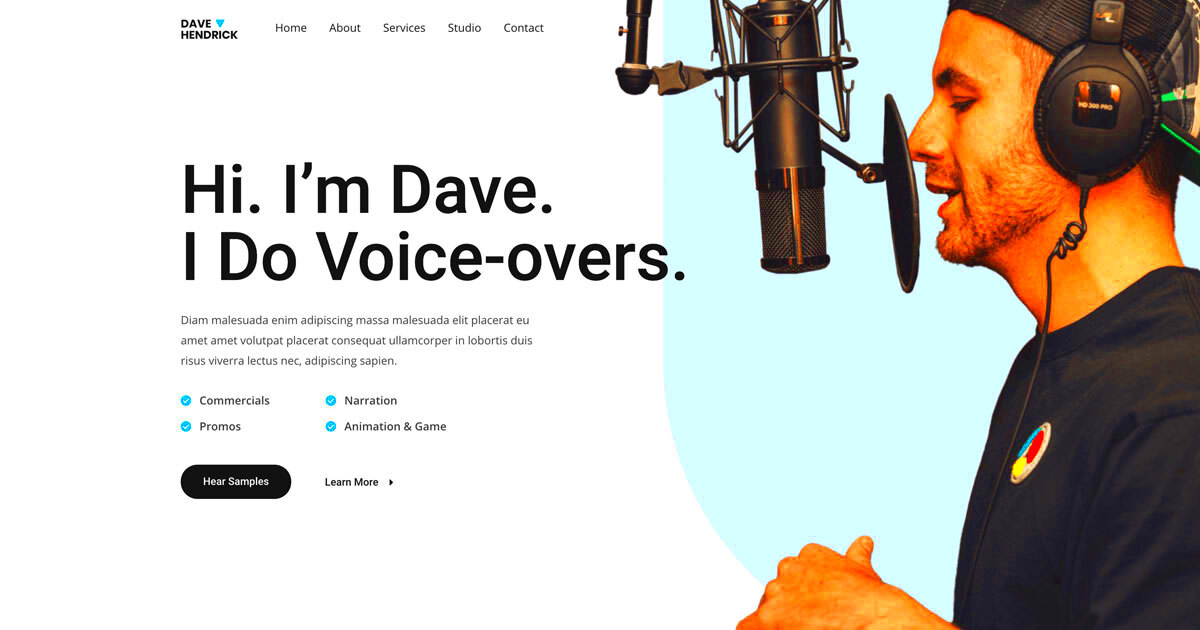The significance of voice-over artists in different media outlets such as commercials, animations, video games, and audiobooks cannot be underestimated. Their main responsibility is to bring scripts to life through their vocal cords adding emotions and individuality to the characters or messages they are portraying. It takes more than just a sweet voice for this work; it entails acting abilities, technique as well as knowledge of the background of the script.
Artists who do voice-over should have the ability to change their tone of voice depending on what they need, thus being versatile. The role has other important points that need attention such as:
- Acting Ability: You need to convey emotions and intentions through your voice.
- Technical Skills: Familiarity with recording equipment and editing software is crucial.
- Understanding the Audience: Tailoring your voice to connect with the target audience is essential.
Identifying Your Niche in Voice-Over

In voice-over, it is very important to determine one’s specialty. Different kinds need different approaches and abilities; thus, knowing your area of concentration will help you with training and marketing. Some of the leading kinds of niches in voice-over are as follows:
- Commercials: Short, engaging voice work for ads.
- Animation: Character voices for animated shows and films.
- Video Games: Voicing characters in interactive entertainment.
- Audiobooks: Narrating stories for listeners.
Evaluate your interests and also your strengths, this will help to select a niche. Make some samples in various styles to assess your place where you are good at and where you find it pleasant to work.
Also Read This: How to Set Up Fiverr Direct Deposit: A Step-by-Step Guide
Developing Your Voice and Skills

The practice of enhancing one’s voice and refining it becomes an indefinite process for each voice-over artist. Here are some effective strategies that can help you build your talents:
- Vocal Exercises: Regular practice helps strengthen your vocal cords and improve clarity.
- Acting Classes: These can enhance your ability to interpret scripts and convey emotions.
- Listening and Imitation: Study professional voice actors and try to mimic their styles.
- Feedback: Seek constructive criticism from peers or mentors to identify areas for improvement.
The more styles and techniques you encounter in your practice, the clearer it becomes that individuals improve through exposure. Therefore, an important part of growing as a voice actor is always being on the lookout for new ways to learn more.
Also Read This: How to Submit Proof on Fiverr: A Step-by-Step Guide
Building a Home Studio for Recording

For any voice-over artist, it is very important to have a home studio. A soundproof and well-equipped room enables you to create professional recordings with no disruptions. You don’t require huge money to begin; even a small area can work if arranged in the right way. The essential parts that will be required include:
- Microphone: Invest in a good quality condenser microphone. Brands like Audio-Technica and Rode are popular choices.
- Audio Interface: This device connects your microphone to your computer, converting your voice into digital audio. Look for interfaces from Focusrite or PreSonus.
- Headphones: A pair of closed-back headphones helps you monitor your recordings without bleed. Consider models from Sennheiser or Sony.
- Soundproofing: Use acoustic foam panels or blankets to reduce echo and outside noise.
- Recording Software: Software like Audacity (free) or Adobe Audition (paid) lets you edit your audio easily.
Once your gear is ready, make sure that your recording area functions properly. Modify it if necessary to optimize audio output. Do not forget that an inspiring and relaxed setting improves output and stimulates creativity!
Also Read This: Exploring the Benefits of Using es.fiverr.com for Freelancers and Entrepreneurs
Creating a Strong Portfolio to Showcase Your Work
Inside this genre of vociferation, you are marked by your resume. It illustrates your versatility in sound, aesthetics, and career development thus offering decision-makers a chance to appraise your qualifications. An extraordinary organized portfolio may make you different from others; hence, here are some tips to come up with a good one:
- Sample Clips: Include 3-5 diverse samples of your work. Ensure each clip highlights different styles, such as commercials, narration, and character voices.
- Professional Presentation: Use a clean and easy-to-navigate format. You can create a simple website or use platforms like SoundCloud.
- Bio Section: Share a brief biography, detailing your background and voice-over experience. This helps clients connect with you on a personal level.
- Client Testimonials: If you have worked with clients before, include positive feedback. This builds credibility and trust.
You should always keep your portfolio up-to-date with your latest works and improvements. A live portfolio not only displays the skills you possess at the present moment, but it also demonstrates how far you have grown as an artist over the years.
Also Read This: Can I Work on Fiverr Without a License?
Marketing Yourself as a Voice-Over Artist
For a freelancer voice-over artist, marketing is important for improving their customer base. This is not simply an issue of talent but also making a name known. Following are some of the effective methods to help with marketing:
- Social Media: Use platforms like Instagram, Facebook, and LinkedIn to showcase your work, share insights, and connect with potential clients.
- Networking: Attend industry events, join voice-over forums, and connect with other professionals. Building relationships can lead to valuable referrals.
- Online Presence: Create a professional website that includes your portfolio, contact information, and a blog to share your experiences and tips.
- Audition Platforms: Sign up for platforms like Fiverr, Voices.com, or Upwork to find job opportunities and get your foot in the door.
Marketing is indeed a never-ending process that needs to be consistent. For you to know what is best for you, always engage with your audience and refine your strategies. You will be able to increase your visibility through proactivity, thereby opening up avenues that are full of excitement!
Also Read This: Adding Freelance Work to Your Resume Sample
Finding Opportunities and Getting Hired
There are ways to go about it like any other job in the world today. If you are looking forward to starting a voice-over artist, this could be a big problem for you. However, many avenues are open for exploration. It requires being proactive as well as persevering in your quest for opportunities.. Here is how some of them can help you get gigs:
- Online Marketplaces: Websites like Fiverr, Voices.com, and Upwork are great platforms to find voice-over jobs. Create a compelling profile that showcases your skills and experience.
- Networking: Attend industry meetups, workshops, or conferences. Building connections with producers, directors, and fellow artists can lead to job opportunities.
- Cold Outreach: Don’t hesitate to reach out to local businesses, advertising agencies, or production companies. Send them a brief introduction and a link to your portfolio.
- Social Media: Use platforms like LinkedIn, Facebook, and Instagram to network and share your work. Join voice-over groups to find leads and collaborate with others.
Remember that a lot of times getting an employment involves auditioning for various roles. Take every audition seriously; don’t let rejections discourage you – just keep improving yourself and soon opportunities will come your way!
Also Read This: Why You Can’t Publish Your Gig on Fiverr: Common Issues and Solutions
Continuously Improving Your Craft and Techniques
The voice-over industry is always evolving, and staying ahead requires continuous improvement. Investing time in enhancing your skills can make a significant difference in your success. Here are some ways to keep growing as a voice-over artist:
- Regular Practice: Dedicate time each day to practice different styles and scripts. This helps keep your voice and technique sharp.
- Feedback: Seek out constructive criticism from peers or coaches. Understanding how others perceive your work can provide valuable insights.
- Workshops and Courses: Consider enrolling in voice-over workshops or online courses. Learning from experienced professionals can provide new techniques and approaches.
- Listening and Analyzing: Listen to professional voice-over artists and analyze their techniques. Take notes on their delivery, pacing, and emotional connection.
Also Read This: How to Find a Designer on Fiverr
Frequently Asked Questions about Voice-Over Work
During your voice-over journey, questions are likely to crop up. The following are some commonly asked questions that will serve as a guide in your learning process:
| Question | Answer |
|---|---|
| What equipment do I need to start? | You’ll need a good microphone, audio interface, headphones, and recording software. A soundproof space is also essential. |
| How do I set my rates? | Research industry standards and consider your experience, project length, and client budget. Adjust your rates as you gain more experience. |
| Do I need formal training? | While not mandatory, training can help improve your skills and understanding of the industry. |
| How can I find work? | Use online marketplaces, network within the industry, and reach out to potential clients directly. |
| Is voice-over work sustainable? | Yes, with dedication and continuous improvement, many voice-over artists build successful and sustainable careers. |
Feel free to search for any other information and inquire any questions that you want. You will have more chance of flourishing in voice-over with improved knowledge!
Conclusion on Your Journey as a Voice-Over Artist
Your path as a voice-over artist is distinctive and contains numerous possibilities for expansion and expression. It necessitates commitment, perpetual learning, and an active technique for discovering work. You establish the base of a successful profession by understanding the role, choosing your niche, developing a home studio, and making a powerful portfolio. Bear in mind that in voice-over industry one must be dynamic by constantly bettering their skills for them to remain relevant with changing trends.
Do not be afraid to network and seek knowledge from other individuals in the same field as you promote yourself. Every stride you make towards formulating your objectives, hence continue with rehearsals, auditions and keep an eye on what people have to say about you. Nevertheless, it is notable that your enthusiasm and determination will ultimately prevail resulting into fruitful job offers and useful contacts in voice-over industry. Savor each step of this process while ensuring that your voice becomes audible!




